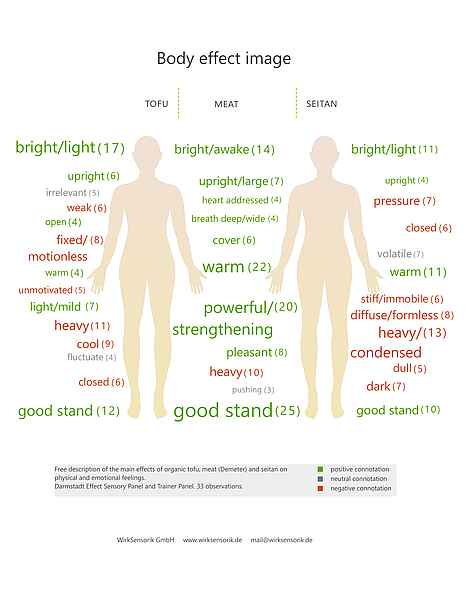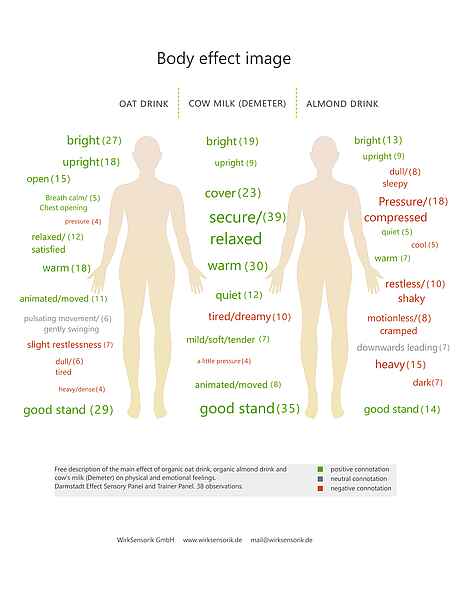Two groups of test subjects assessed the effects of animal-based and plant-based products on their physical and emotional well-being, testing each product twice. The items tested were beef, tofu, and seitan, as well as cow’s milk, oat, and almond drinks. All products were organic-certified; the meat and milk were Demeter-certified.
Beef, Tofu, and Seitan
When comparing the perceived effects of tasting beef, tofu, and seitan, beef received notably more positive descriptions (green text, see figure). Tofu and seitan, despite a few positive descriptions, had primarily negative associations, including feelings of heaviness, solidity, and immobility. For seitan, there were also observations of pressure, dullness, and darkness (red text). The degree of the physical effects (e.g., refreshed, motivated, focused) as well as the emotional impacts (e.g., relaxed, comfortable, content, and balanced) differed significantly between beef and the plant-based alternatives, which were more similar to each other.
In terms of nutrients, these products are also quite different and are not interchangeable. Meat contains primarily protein, water, some fat, but no carbohydrates, unlike tofu and seitan. There are also differences in vitamins and minerals.
Unlike plant-based products, meat reflects the unique character of the animals from which it comes. Factors such as their feed and living conditions before slaughter influence quality. For instance, a study found significantly lower levels of stress hormones in farm-slaughtered animals compared to those processed in a slaughterhouse.¹
Meat, due to its animal origin, is often associated with emotions, which is why it is avoided by people following a vegetarian or vegan lifestyle.
Cow’s Milk, Oat Drink, and Almond Drink
Cow’s milk received the most positive descriptions (green text, see figure), notably evoking feelings of warmth, relaxation, and security. Oat drink also had mainly positive descriptions (satisfaction, openness, uprightness), but distinct from cow’s milk. The almond drink, however, was associated with sensations like pressure, restlessness, and heaviness. This was surprising, as almonds are generally known for positive effects such as warmth and energy.
The differences in perception were sometimes significant, with cow’s milk and oat drink being somewhat similar, yet both differing considerably from almond drink.
The plant-based drinks tested were commercially available, industrially manufactured products. Unlike the pasteurized oat drink, the almond drink was ultra-high-temperature processed, giving it a particularly intense level of processing.
Compared to cow’s milk, plant-based drinks generally have lower energy density and lower levels of protein, fat, and carbohydrates. They also contain added sugars and fewer nutrients such as calcium.² Cow’s milk, while animal-derived, is less influenced by the animal’s character than meat. Plant-based products, on the other hand, are seen as having a more selfless character, unconnected to emotions and instincts as animal products are.
Summary
Beef and vegan meat alternatives, as well as cow’s milk and plant-based drinks, differ not only in production but also in taste. The project’s results further indicate that their physical composition and their effects on physical and emotional well-being, as captured by Wirksensorik®, also vary. Thus, they are products of entirely different qualities, making them less of direct alternatives and certainly not substitutes.
It’s important to note that these findings represent sample products. Therefore, the results do not apply universally. However, the EmpathicFoodTest® method has shown that significant differences can indeed be identified.
Our choices of what we eat are highly individual. Flavor, personal preferences, values, and food trends all play a role. Awareness of how foods affect our physical and emotional well-being can be another way to strengthen personal nutrition knowledge. At a moment of mindfulness, one can consciously decide what to consume – what does my body need right now? Perhaps it is a comforting, warming presence (e.g., when I feel anxious) that milk provides, or a sense of clarity and openness (e.g., when I need to think clearly) that an oat drink can bring.
Sources
¹ Spengler Neff A., Probst J. K., Knösel M. (2023), Farm-slaughter vs. Slaughterhouse: Differences in Stress-Related Parameters. Agrarforschung Schweiz 14: 90–95, doi.org/10.34776/afs14-90
² Burton-Pimentel, K. J., Walther, B. (2023), Plant-Based Drinks – An Alternative to Milk? Agrarforschung Schweiz 14: 214–228, doi.org/10.34776/afs14-214
Project Literature and Methodology
Geier U., Peschke J., Wieckmann P., Mandt G. Emotional profiling of cow's milk, beef, and plant-based alternatives by trained observers. In preparation.
Geier U., Scheller E. (2021), New Methods for Evaluating Emotion-Inducing Effects of Food. Ernährung im Fokus 02 2021.
Geier U., Büssing A., Kruse P., Greiner R., Buchecker K. (2016), Development and Application of a Test for Food-Induced Emotions. PLoS ONE 11(11): e0165991. doi:10.1371/journal.pone.0165991
Project Team
Dr. Jasmin Peschke,
Nutritional Scientist & Wirksensorik Trainer,
Head of Nutrition, Goetheanum
www.sektion-landwirtschaft.org/ernaehrung
Pamela Wieckmann,
Nutritional Scientist & Wirksensorik Trainer,
Managing Director of HofAkademie
www.hofakademie-arpshof.de
Dr. Uwe Geier,
Managing Director & Quality Development, Forschungsring e.V.
www.forschungsring.de

